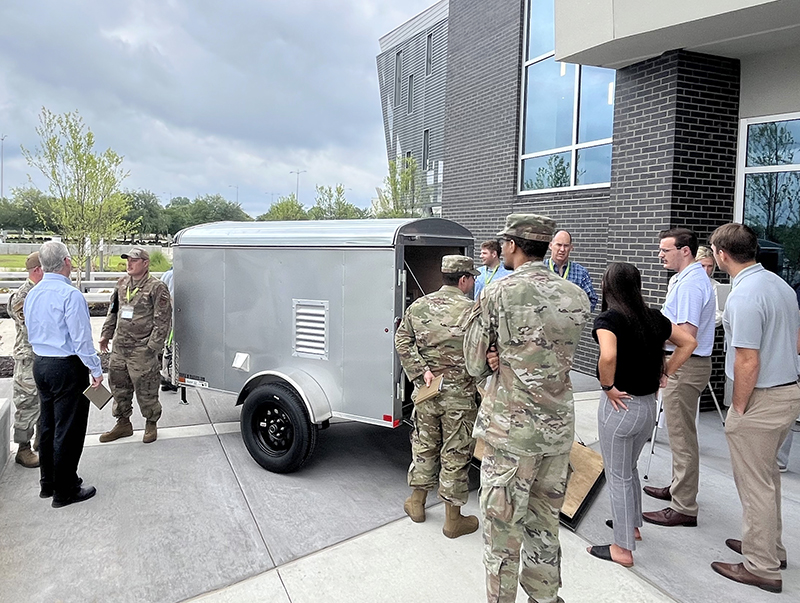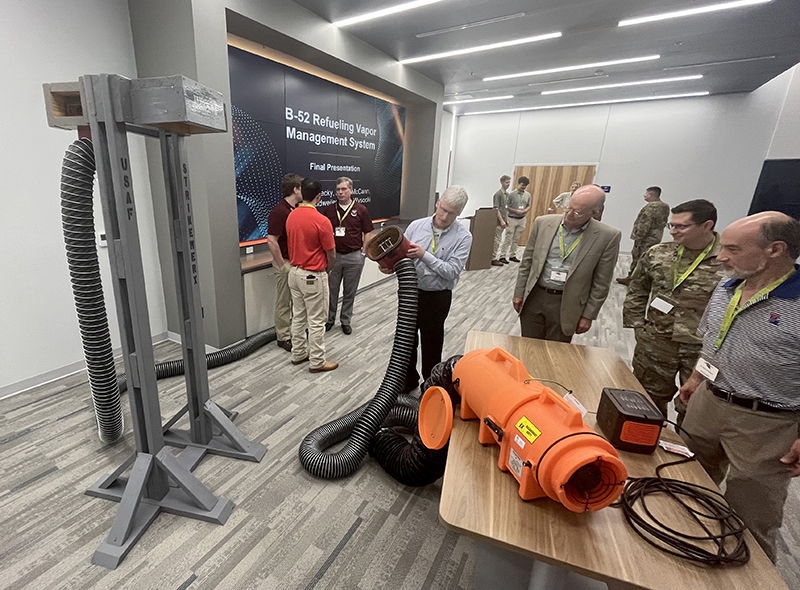LA Tech students developed a fuel vapor management prototype for use when refueling the B-52 and presented it at the Louisiana Tech Research Institute in May 2024. (Victoria Price/CIC)
By Sean Green | STRIKEWERX Communication Manager
BOSSIER CITY, La. — Louisiana Tech University engineering seniors recently unveiled their designs to solve two challenges faced by the B-52 aircraft.
One team of students developed a vapor management system for use in hot pit refueling of the B-52, while a second team created a prototype for protecting the load bank test set, which is a cart that tests electrical systems of the B-52 aircraft.
Hot pit refueling allows B-52 bombers to land, refuel on the ground with one or more aircraft engines running, and then take back off. Hot pit refueling has the potential to prevent engine and mission system shut down, avoid delays, reduce risk, and reduce the need of special equipment to restart the engines and systems.
The issue is that during refueling, jet fuel vapors escape vents on the airplane, which creates an ignition risk when engines are left running.
The students constructed prototypes that will affix to the vents of two ventilation systems while refueling, where they will collect the vapors and channel them to adequate distances via ducting.
“We wanted to create an end result that would keep servicemen safe, perform its duty successfully, and be produceable in quantities required to meet the needs of the U.S. Air Force,” said Adam McCann, a student working on the vapor management project. “We knew that what we were building in a garage could someday seriously affect the lives and safety of real people. This drove us to be even more diligent and exacting in the standards we held ourselves to.”

The load bank test set requires shielding from rain and standing water, as it cannot be used in inclement weather due to the risk of electrical shock or damage to the equipment.
The students selected a covered trailer with a roof-mounted air conditioning unit, loading ramp, ventilation, and opening for insulated wires to connect to the B-52. This will protect the load bank test set from weather and water, promote proper airflow, and reduce temperatures in the trailer, prevent equipment from overheating, and make the environment more comfortable for Airmen when in use.
Nathanael Marino was part of the team working on the load bank test set and noted their approach focused on the end user with a priority on safety, ease of use, and familiarity.
“This involved taking a piece of equipment that is already well-understood in its function and modifying it with numerous safety features to adhere to and exceed project specifications,” he said.
The project was sponsored by the Air Force Global Strike Command (AFGSC) Office of the Chief Scientist managed by the Cyber Innovation Center (CIC) via its partnership intermediary agreement with AFGSC.
“I’m in awe at what our students accomplish and the value they provide to sponsors like CIC, are truly a testament to the outstanding educational experience our faculty provide, along with the high quality of our students,” said Dr. Collin Wick, dean of Louisiana Tech University College of Engineering and Science. “We are very thankful to CIC and other sponsors to support this educational experience allowing them to apply their skills to make a real impact in nationally important challenges.”
Marino said this project has significantly prepared him for his future career by offering the chance to apply his knowledge to real-world challenges.
“These projects offer valuable opportunities to learn new skills and serve as a trial run for the creative problem-solving you’ll do after graduation,” he advised future students, “so enjoy the process and try to learn as much as possible along the way.”
About the Cyber Innovation Center
Cyber Innovation Center (CIC), located in Bossier City, Louisiana, is the anchor of the 3,000-acre National Cyber Research Park and serves as the catalyst for the development and expansion of a knowledge-based workforce throughout the region. As a 501c3 not-for-profit corporation, CIC fosters collaboration among its partners and accelerates technology, research, and development. One of its primary missions is to develop a sustainable knowledge-based workforce that can support the growing needs of government, industry, and academic partners.


